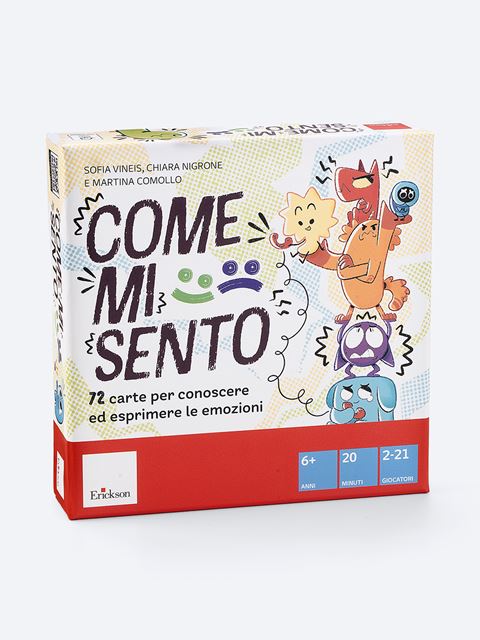 EN
EN
 PT
PT
72 cards to recognise and express emotions

Product: Teaching tools
Trim size in cm: 13,8 x 13,8 x 4,5 cm
ISBN: 9788859041740
Publication date: 01/03/2025
Suitable for: Primary 1st level (ages 6-7), Primary 2nd level (ages 8-10)
REQUEST A SAMPLE OR MORE INFORMATION
How I Feel is a game that turns emotions into an adventure! Using illustrated cards and interactive activities, it helps children and adults recognise and express feelings in a natural and enjoyable way. Perfect for both the classroom and home, this game fosters empathy, communication, and emotional awareness, encouraging emotional intelligence and helping players understand themselves and others through play.
How to play? Players pick a card and complete the sentence “I feel…” with the emotion shown, promoting emotional sharing and awareness.
Teaching objectives
• 72 Illustrated Cards
• Poster with the "Working Well Together" Agreement
• Instruction Book

72 cards to recognise and express emotions
Sofia Vineis, Chiara Nigrone, Martina Comollo

How I feel is an innovative educational game that combines visual language with playful learning to help children explore, name, and manage their emotions.
Designed for use in schools, but also suitable for clinical, educational, and family settings, the game was developed by a multidisciplinary team with direct experience in Italian schools. Its key strength lies in making emotional education accessible and engaging, fostering empathy, self-awareness, and positive relationships.
The activities included in the game follow the guidelines of the Life Skills Education programme suggested by the World Health Organization (WHO) and aimed at promoting children’s psychological well-being.
The box contents

72 illustrated cards representing emotions and sensations

Poster with the "Working Well Together" Agreement

Instruction Booklet
How to play
Every game session begins with a group reading and signing of the “Working Well Together” agreement – a shared set of rules to create a safe and respectful environment.
The game is built around 72 illustrated cards, each showing the phrase “I feel…” alongside an image of a little monster representing an emotion or sensation. The cards are divided into five decks: Basic emotions (orange), Secondary emotions (light blue), Advanced secondary emotions (purple), Sensations (green), Blank customisable cards (red).
Each activity comes with reflective questions to encourage discussion, sharing, and empathy. The 10 game modes are flexible and adaptable to different ages and settings. Activities include:

Telling my emotions: each player draws a card and tells a personal experience related to that emotion

Drawing my emotions: emotions are drawn based on those picked or personally experienced

Miming my emotions: players act out an emotion for others to guess

Emotion theatre: in groups, players create and act out a story using characters, places, magic objects, and emotion cards
Leaf through some selected pages from the instruction book that have been translated into English to facilitate your evaluation:
Watch the video about the game How I feel
The Author
Sofia Vineis is an educator, systemic counsellor, and pedagogical consultant in school, legal, and family settings. She has long worked in schools on listening and mediation projects, collaborating with institutions and community organisations.
Chiara Nigrone is a psychologist, psychotherapist, and drama therapist. She works in clinical and educational contexts with children, adolescents, families, and organisations.
Martina Comollo is a child and adolescent psychotherapist with a psychodynamic approach. She specialises in psychological assessments and therapy for minors, parental support, and collaborates with schools and voluntary associations.